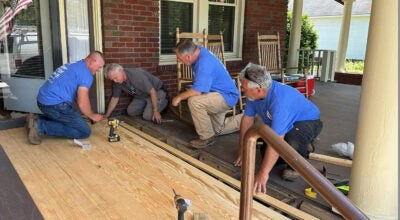New Fibrant chief: Fiber optic utility can still meet 2014 goal
Published 12:00 am Tuesday, April 3, 2012
By Emily Ford
eford@salisburypost.com
SALISBURY — The new general manager for Fibrant said he plans to lead the city’s broadband service like a business, not a utility.
After a 30-day evaluation period, Mike Jury said he will formulate a long-term strategy for Fibrant to show where he plans to take the network.
On Tuesday, Jury met City Council for the first time and pledged transparency, including communicating with the public about “the good, the bad and the ugly.”
The 24-year veteran of the cable industry sat down for an interview recently in the new Customer Service Center. He started work March 22, the unanimous choice of a hiring panel after a nationwide search.
Jury said he wants to make Fibrant more reliable, develop a package of services for business, improve marketing and better communicate with subscribers.
He said Fibrant needs to promote the network’s strongest assets — local customer service and state-of-the-art infrastructure with an Internet Protocol-based network.
“There is a lot of opportunity left to be tapped,” said Jury, a New Jersey native and former paramedic who lives in Charlotte.
Although Fibrant has fallen behind revenue and subscriber projections, Jury said he believes the utility can meet the city’s goal and become self-sufficient in four years.
Jury must increase subscribers from about 1,800 to about 4,500 by 2014. Fibrant, which billed its first customer in December 2010, competes with private industry to sell Internet, cable TV and phone services to Salisbury residents.
Jury said a 30 percent market share is within Fibrant’s reach. The network now has 13 percent of the local broadband market.
Fibrant recently boosted subscriptions to a rate of about 30 customers per week and cut $100,000 in annual costs by renegotiating a contract with the phone service vendor.
Jury said the utility’s subscriber count — more than 1,800 customers — is a “good number.”
“They are well on the way to achieving the number they need,” he said.
Fibrant’s infrastructure, including 250 miles of fiber optic cable and a headend in the Customer Service Center, is second to none, Jury said.
“You can talk the game, but if you don’t have the infrastructure to support it, it’s not going to work,” he said. “I would call Fibrant’s infrastructure bullet-proof.”
Including internal loans from other city funds and interest on $35.86 million in bonds, Salisbury will pay close to $70 million for the network. The debt payment increases from $1.7 million this year to about $3 million annually from 2013 to 2029.
Yet Fibrant will require ongoing capital investment for network improvements, Jury said.
“That’s where a lot of small, independent overbuilders go wrong,” he said.
They invest heavily to build the network, then financial support dries up.
Jury said if he does his job right, Fibrant will generate enough revenue to cover network upgrades.
Fibrant’s recent four-hour outage was “unacceptable,” Jury said, and he’s looking into ways to prevent future outages.
Fibrant was down most of the afternoon March 12 when a Duke fiber-optic line was cut between Concord and Salisbury. DukeNet provides Fibrant’s primary transport for Internet and phone services.
Jury said he has requested a “full postmortem” from DukeNet detailing the outage. Any time a network he’s responsible for goes down, Jury said he determines the cause and lessons learned and applies them going forward.
While every network will experience outages, Fibrant “has had some reliability issues,” Jury said.
He said he expects Fibrant to achieve “five nines” reliability, or a measure meaning Fibrant would be available 99.999 percent of the time. That translates to an average downtime of about 5 minutes per year.
While Jury said he can’t comment on the March 12 outage until he knows more, he said he will “push vendors to a different standard.”
He agrees Fibrant needs a secondary Internet provider, which city officials have been negotiating. But Fibrant’s primary vendors need to do everything they can to ensure network availability, he said.
It should not take Fibrant’s primary Internet provider nearly four hours to restore service after a line is cut, Jury said. If service goes down, Jury said he expects immediate reaction from Fibrant’s service providers.
“Problems will happen,” he said. “I always judge people on how they react to the problem. That’s how our customers will judge us.”
Fibrant has not tapped the potential of commercial subscribers, Jury said. The utility has about 120 business customers, fewer than projected.
“Businesses are a different set of customers,” he said. “I would like to build a specialized team to support those commercial customers.”
At 43, Jury describes himself as high-strung and a computer geek. He said he relishes a challenge and has never taken a job he didn’t think he could complete.
Jury followed Fibrant online for the past year, setting up a Google news alert. After traveling for work for years, Fibrant’s location near Charlotte attracted him to the job, he said.
“I can come home for dinner now,” Jury said. “There is a lot to be said for that.”
The father of three children ages 16, 15 and 11, Jury said he and wife Kary Jo enjoy motor home vacations and cruises.
Heading out to sea is often the only way Jury can relax, he said.
Jury started his career in the cable industry at age 16, cleaning warehouses in New Jersey.
He worked his way up through the ranks: warehouse manager, cable TV installer, service technician, plant maintenance technician, supervisor, operations manager. Moonlighting for several years as a part-time paramedic, Jury said he did everything but deliver a baby.
Jury said the company he worked for in 1998 in New York City asked him to launch Internet services. It was Jury’s first stint with an independent overbuilder, or an “ugly duckling,” as he called it.
Overbuilders operate in markets already served by big cable. Fibrant is considered an overbuilder.
He spent a year traveling the country then left the company to launch another overbuilder, Wide Open West, with 12 others. The company was based in Denver, Colo. and grew until the dot-com bubble burst in 2000.
In 2001, Wide Open West bought a phone company with a state-of-the-art cable TV system and added Internet services, he said. Based in Chicago, Jury served as vice president of engineering operations.
“That’s where I learned the financial and business side of this industry,” he said.
Now the 15th largest cable provider in the United States, Wide Open West repeatedly won J.D. Power and Associates awards for customer satisfaction during Jury’s tenure and beyond.
Jury and his partners sold the company in 2006, and he and his family moved to Charlotte. He took a position as chief technical officer for Broadstripe, a traditional cable company based in St. Louis, and oversaw mergers and acquisitions for two years.
In 2009, he learned Waycross Cable was in trouble. Jury served as general manager and chief executive officer of the 9,000 subscriber system in Waycross, Ga.
Within three years, Jury said he increased revenue by 22 percent, rebranded the company as Mediastream and launched new services including Voice-Over-Internet Protocol and residential security, leading to the successful sale of the company.
His other executive-level positions were with RCN and Adelphia Communications Corporation.
Like any business, Jury said Fibrant needs time to develop.
“We have the network,” he said. “Let’s run it.”
Critics who call for the sale of the network should give Fibrant a chance, he said.
“You can’t evaluate any business in the first year,” Jury said. “You have to give it time to run its course. This is a good investment, and we don’t want to leave that investment.”
Although he’s never worked for the government before, Jury said his methodology basically will stay the same — forecasting, models and predicting unintended consequences.
Fibrant lacks some flexibility of a private company because key decisions must come before City Council, which meets every two weeks. Jury said that constraint won’t be a problem.
“If I’m doing my job right and planning appropriately, I would never need anything within two weeks,” he said.
Contact reporter Emily Ford at 704-797-4264.




